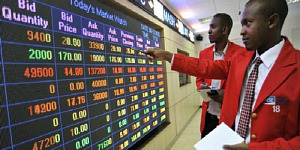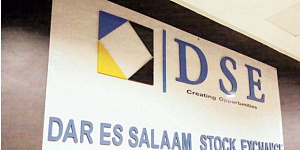 UP to six companies, most of them banks and microfinance institutions, could list on Tanzania’s stock exchange this year, the chief executive of the bourse said.
UP to six companies, most of them banks and microfinance institutions, could list on Tanzania’s stock exchange this year, the chief executive of the bourse said.
Mr Moremi Marwa said at the Reuters Africa Investment Summit he also expected the government to approve regulations for the mandatory listing of shares in mobile phone operators by April.
Like other African bourses, Tanzania’s exchange wants to encourage more firms to list or use the exchange to raise funds via corporate bonds, a potentially cheaper route than borrowing from banks where lending rates can be 18 to 30 percent.
“This year we anticipate five or six IPOs (initial public offerings),” Marwa said in an interview in the commercial capital Dar es Salaam.
“Four listings will be on the Enterprise Growth Market and we anticipate one or two listings on the main market. These IPOs will mainly be from the financial and banking sector,” he said.
Micro-finance firms offer financial services to lowincome individuals or those who do not have access to typical banking services.
In 2014, there was one cross-listing of Kenyan-based Uchumi Supermarkets on the main Tanzanian bourse and two IPOs on the exchange for smaller firms, Mr Marwa said.
The corporate bonds could be listed in the first half of 2015, said Mr Marwa, adding the exchange also wanted to promote the issuance of municipal bonds.
He said regulations required to implement a 2010 law demanding mobile telephone firms list were awaiting approval. Telecoms has been Tanzania’s fastest expanding industry. Operators include Vodacom Tanzania, a unit of South Africa’s Vodacom; India’s Bharti Airtel; Tigo, a unit of Sweden’s Millicom Cellular International; and United Arab Emirates telecoms operator Etisalat (Zantel).
Mr Marwa said moves to ease restrictions on foreign investment had expanded the bourse’s market capitalisation by 35 percent in 2014 to reach 22.1 trillion shillings ($12.04 billion).
Tanzania scrapped a rule in September that had barred foreign investors from buying more than 60 percent of shares in a listed firm.
“We uplifted the foreign investors limit but also as a country we partially opened up the capital account in order to attract more foreign investors to participate in our market both on the equity side and the fixed income side,” he said.
“Previously foreign investors used to participate on the buy side, they usually weren’t selling. But since September, we have seen a significant increase in terms of foreign investors selling their positions as well to other foreign investors.”





















































